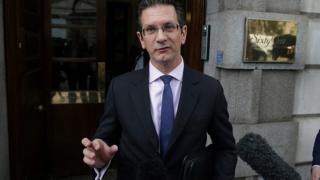 Image copyright
AFP
Image copyright
AFP
Ex-Brexit minister Steve Baker has warned Theresa May "at least 40" Tory MPs are poised to vote against any deal she agrees based on her Chequers plan.
He said there were around 80 Tories opposed to the PM's current approach and Conservative whips "would be doing well" to reduce the number by half.
He predicted that "every possible technique" would be used to put pressure on rebellious Conservatives.
Parliament is to vote on the terms of Brexit ahead of the UK's 29 March exit.
MPs have been promised a "meaningful vote" this autumn on the terms of the UK's separation from the EU as well as the framework of future economic relations with the bloc.
Talks between the two sides are entering a critical phase in the hope that an agreement can be struck by the middle of November at the latest.
Brexit Secretary Dominic Raab is expected to brief MPs later on developments since last month's Salzburg summit, when EU leaders rebuffed the PM's plan for a free trade zone for manufactured and agricultural goods, underpinned by a common rule book, and a combined customs territory.
This led to an angry response from Mrs May, who accused EU leaders of showing the UK a lack of respect.
Since then, senior EU officials have appeared more positive, suggesting 95% of the withdrawal agreement has been settled and a final deal was possible this autumn.
But Mr Baker, who is regarded as a key figure in any threatened revolt against Mrs May, has said "powerful forces" within the government were seeking to scupper Brexit.
In a video message, he said there were some in government who wanted to keep the UK in "high alignment" with the EU. "They may be preparing the ground to rejoin the EU later," he said.
Mr Baker and other backbench critics of the PM, including former cabinet ministers Boris Johnson and David Davis, want a looser arrangement modelled on Canada's trade deal with the EU.
The PM and her cabinet allies have said this is unviable as it does not provide a solution to the Irish border issue and risks separating Northern Ireland from the rest of the UK.
International Development Secretary Penny Mordaunt, a prominent Leave campaigner in the 2016 referendum, said the PM had her "full support" at a critical moment in the negotiations.
"I don't doubt her motives, I don't doubt her commitment and I don't doubt for one moment her understanding that we have to deliver a good Brexit, we have to honour that result," she told journalists following a speech in London on aid policy after Brexit.
"So she has my support and I am not in any way expecting that situation to change."
The EU and UK are at loggerheads over the so-called Irish backstop, the arrangement designed to guarantee that there will not be a physical border on the island of Ireland, whatever the wider UK-EU deal.
'False choice'
Brussels wants Northern Ireland to effectively remain in the customs union and single market - an outcome the UK has said it cannot accept as it would effectively create a border between Northern Ireland the rest of Great Britain.
The UK's counter-proposal would see the country as a whole remaining aligned with the EU customs union for a limited time after the end of 2020, when the proposed transition period ends.
The pressure on Mrs May is set to be intensified by the Democratic Unionist Party leader Arlene Foster, who is restating her "blood red" lines in a series of meetings with EU officials in Brussels.
She will warn of the "catastrophic" consequences for the Northern Irish economy if any trade barriers were introduced between Northern Ireland and Great Britain.
Meanwhile, the former Labour foreign secretary and Leave supporter Lord Owen has said the UK should remain a member of the European Economic Area during the 21-month transition period and possibly until the Spring of 2022, to give it the necessary time to conclude a Canada-style trade deal with the EU.
Publishing correspondence between himself and Mrs May on his website, he said the prime minister should "be ready to give Parliament a proper choice, not a false one based on fear".